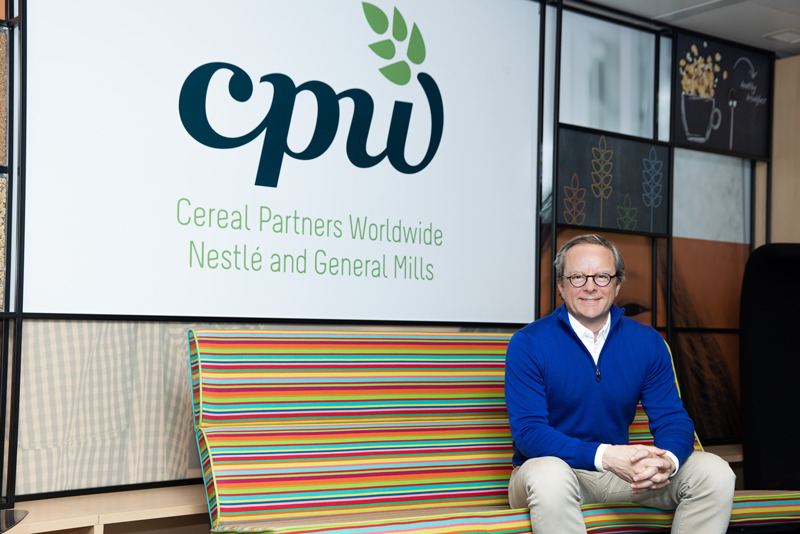
Cereal Partners Worldwide (CPW), the makers of Nestlé Breakfast Cereals, has announced the release of its 2050 Net Zero Roadmap. The roadmap sets out CPW’s aims to halve its greenhouse gas emissions by 2030 and reach net zero by 2050.
The Net Zero Roadmap is one of the ways CPW is living up to its purpose to Make Breakfast Better. The data-driven roadmap outlines the initiatives CPW is taking throughout its value chain to reach its target, from sourcing ingredients to making and shipping its products.
David Clark, President & CEO at Cereal Partners Worldwide, commented: “Climate change is one of the greatest challenges of our time. As a company, we have a responsibility not only to our consumers but also to the communities in which we operate and to the planet. We want to make breakfast better, while creating a positive impact on the world around us. We have paid close attention to how we source ingredients and make our products for many years – so this is not the start of our journey to contribute to a better planet. The development of our 2050 Net Zero Roadmap is an important next step, and we are pleased to be setting ourselves clear actions to ensure we meet our targets.”
The roadmap is the result of a large-scale audit with external consultancy, Quantis, of emissions across CPW’s business, a process that involved working with many others, such as farmers and logistics providers. This audit determined the actions the company could accelerate or introduce to reduce its carbon footprint. The audit found that CPW emitted 1.2M metric tons of greenhouse gas emissions in 2018, which will serve as the baseline for measuring progress.
CPW’s approach to reaching net zero spans five key areas:
- Sourcing ingredients: With the sourcing of ingredients contributing to more than half (56 percent) of CPW’s greenhouse gas emissions, the company will continue to focus on sourcing ingredients in a more sustainable way. This action will be driven by moving towards regenerative agriculture. By 2025, 13 percent of CPW’s cereals will come from regenerative agricultural practices. This includes working with farmers to help them safeguard biodiversity, water, and soil health, while reducing their dependency on conventional agrichemicals.
CPW is also moving towards 100percent deforestation-free ingredients (e.g., palm oil, pulp and paper, cocoa). Since the end of 2022, CPW joined the Nestlé Cocoa Plan, which will ensure 100%of its cocoa is deforestation-free by 2025, supporting the lives of farmers and their families and helping them to maintain the quality of their cocoa beans.
- Transforming the product portfolio: CPW will place its net zero goal at the heart of its innovation process across its product portfolio. This includes a focus on choosing ingredients with lower carbon footprints; repurposing by-products or waste materials into new products; and continuing to pilot circular economy business models.
- Evolving packaging: The company will continue to evolve the packaging of its products, committing to making 100 percent designed for recycling1 by 2025 and reducing excess packaging where possible – 98% of packaging is already designed for recycling today.
- Moving toward cleaner operations: CPW have completed the transition of its 15 production facilities to 100 percent grid-sourced renewable electricity. It will also continue to improve energy efficiency across its operations, switching to alternative renewable energy sources and reducing waste.
- Driving towards cleaner logistics: Emissions will continue to be reduced across transportation by maximising the use of space in vehicles, reducing fuel consumption and switching to lower emission fuels. By 2025, 100 percent of CPW’s internal shuttles, which transport products from factories to distribution centres, will be electrical.
Christine Truppe, Global Head of Sustainability at Cereal Partners Worldwide, added: “It is estimated that soil produces 95 percent of the world’s food2 but it’s also being eroded at a much faster rate than it’s forming. Intensive farming practices have depleted biodiversity and water systems are being strained due to pesticide use and poor water management. Farmers are facing huge challenges all around the world.
“With more than half of our emissions coming from the ingredients for our products, 35 percent of them are connected with cereals and grains. It is clear we need to work together with our suppliers, farmers, and parent companies as we tackle these emissions as a focus on our journey to net zero. Our commitment on regenerative agriculture3 shows the potential to positively impact a wide range of interconnected issues, while remaining firmly grounded in an outcome-focused approach. As part of our Net Zero roadmap, CPW is working towards sourcing key ingredients (specifically cereals and grains) produced using regenerative agriculture methods (13 percent by 2025 and 50 percent by 2030).”
1Local infrastructure with sufficient capacity for sorting, collection, recycling must be at scale for a material to be classified as recyclable, ISO 14021
2FAO report: Healthy soils are the basis for healthy food production.
3There is no commonly accepted / regulatory definition of ‘regenerative agriculture. So, Nestlé defines Regenerative Agriculture as: A farming system centred around agronomical principles that aims to protect and restore natural resources primarily soil, but also water and biodiversity. It also aims to improve soil health and soil fertility, at the same time as promoting the capture of carbon (i.e., greenhouse gas emissions) in soils and plant biomass.










